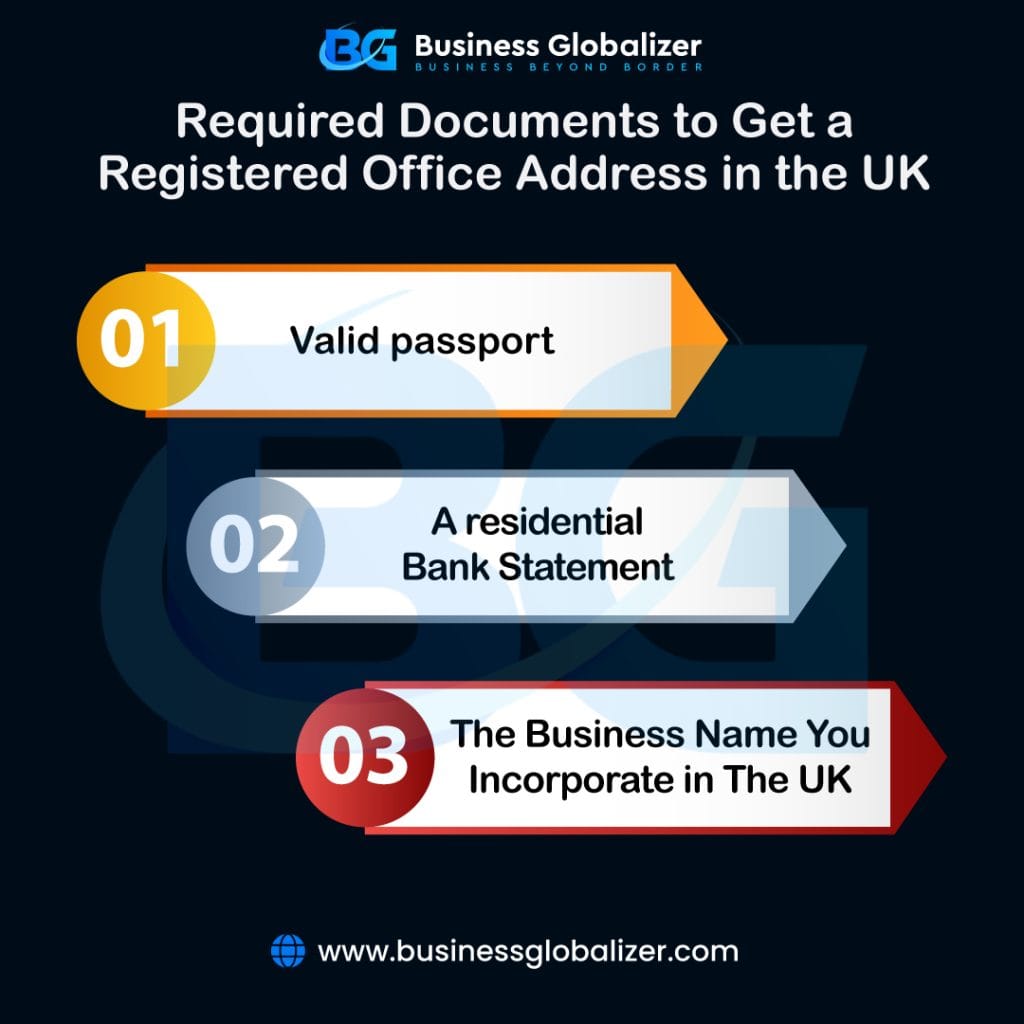Hey, are you thinking of expanding your business venture? Are you eager to embark on an entrepreneurial journey in the UK? If yes, you should know about a registered office address in the UK, as it is your business’s official hub.
In this short guide, we’ll show you how to secure one. We will explore how a registered office address can be the key to compliance and a strong business foundation.
Let’s dive in and make your mark in the dynamic UK business landscape!
What Is the Registered Office Address?
When a company uses a physical address in the UK for official purposes—where official documents are sent—it is called a registered office address.
A registered office address must be a physical one because that is where the business organization can send and confirm receipt of official government correspondence and other company mailings. This is a legal requirement for all companies registered at Companies House in the UK.
Every limited company and limited liability partnership has to provide a registered office address during incorporation. Companies must maintain a registered office address throughout their existence. HMRC and other government bodies will also use this address to send you statutory letters, including legal notices.
What Are the Benefits of a Registered Office Address in the UK for Business?
It is a legal requirement for all incorporated companies in the UK to have a registered office address. However, having a UK-based address can also bring multiple benefits to a business.
Those benefits include the following:
- Professional Image: A prestigious or central location can enhance the professional image of your business. It provides a sense of stability and permanence, which can be reassuring for clients and partners.
- Business’s Credibility: A registered office in a well-known business district can boost your company’s credibility. It signals to clients, suppliers, and investors that your business is established and serious about its operations.
- Mail Handling: The registered office is the official address for receiving essential documents and official correspondence. This ensures that important mail is received and handled promptly, avoiding potential legal or compliance issues.
- Privacy: A registered office address can give you privacy because it lets you use a different address instead of your home address for official government records and legal documents. This means that your personal address is not made public or easily accessible to anyone looking up information about your company.
- Local Presence: If you are a non-resident or your business operates nationally or internationally, having a registered office in the UK can create a local presence for your company. This can be advantageous for marketing and business development purposes.
- Compliance: Meeting the legal requirement of having a registered office ensures that your business complies with UK company law. Not following this rule can have dire consequences.
- Requirements for Dormant Companies: Even if your company is dormant (i.e., not actively trading), it must still comply with specific legal requirements. This includes having a registered office address where official communications and legal notices from HMRC and Companies House can be sent. This may result in penalties or the company being struck off the register if the dormant company fails to comply with the requirement.
Also, if you decide to restart your business activities, having a registered address in place can make the process smoother. It ensures you have a legal and official base to resume operations.
Who Needs the Registered Office Address?
You may be wondering who needs the registered address. Business entities must have a registered office address for legal and other reasons. The following needs a registered office address:
- Limited Companies: Every limited company (private and public) registered in the UK must have a registered office address. Section 68 of the Companies Act 2006 states that this is a mandated requirement.
- Limited Liability Partnerships (LLPs): Similar to limited companies, LLPs must also have a registered office address. It serves as the official address for correspondence and legal communications.
- Sole Traders and Partnerships: A registered office can still be beneficial. Although it is not a legal requirement for sole traders and traditional partnerships, it provides a separate business address from personal addresses, enhancing professionalism.
- Charities and Nonprofit Organizations: Charities and nonprofit entities must have a registered office address shown on the public records of the Charities Commission. This is necessary for official communications from regulatory bodies and transparency in their operations.
- Overseas Companies Operating in the UK: Foreign companies that establish a presence in the UK, either through a physical office or by conducting business, must also have a registered office address.
- Any Entity Engaging in Business Activities: Any entity engaging in business activities in the UK needs a registered office address. It is the official address for receiving important documents, legal notices, and official correspondence.
Why and Where Do You Need to Use Your Registered Office Address?
The registered office address is critical to a business’s legal and administrative structure. Here’s why you need to use your registered office address:
- Legal Requirement: In the UK, businesses are legally required to have a registered office address according to laws such as the Companies Act of 2006.
- Shareholder and Director Communications: Shareholders and directors may use the registered office address for company-related communication. It provides a formal and recognized point of contact for key stakeholders.
- Official Correspondence: The registered office address is where official documents and legal notices from government bodies, regulatory authorities, and other official entities are sent. This includes documents related to company registration, tax, and legal proceedings.
- Legal Notices and Service of Documents: Legal notices and court documents are served to the registered office address in the event of legal action. It ensures that the company is adequately informed about legal proceedings.
- Business Registration: The registered office address is used during the initial registration of the business entity. It is crucial information that must be provided when setting up a company.
- Contact Points for Shareholders and Creditors: Shareholders and creditors often use the registered office address as a contact point. It’s the location where they can send official communications or notices.
- Annual Filings: The registered office is specified in annual returns and accounts filed with Companies House. These filings are part of the ongoing legal obligations for companies.
Here are some key areas where you need to use your registered office address:
- Business Registration.
- Statutory Registers.
- Companies House Register.
- Government authorities, regulatory bodies, and other official entities.
- HM Revenue and Customs or HMRC.
- Annual Returns and Accounts.
- Official Documents, Notices and Contracts.
What Type of Address Should You Choose for Your Registered Office?
Choosing the correct type of address for your registered office is essential for legal compliance, professionalism, and privacy. Choosing a UK-registered office address requires some considerations:
- The company must register their office address in the same jurisdiction as their primary registration in the UK (England and Wales, Scotland, or Northern Ireland).
- You can only use a full, physical postal address as a registered office. You can use either a residential or a non-residential address, but most people prefer to use commercial addresses to keep their privacy.
- Your registered office address should be a professional one that reflects your business’s image. This may mean choosing a commercial address or a virtual office address.
- Professional advice can help you comply and make an informed decision based on your situation.
Which Statutory Records Must Be Kept at the Registered Office Address of a Business?
UK companies must maintain various statutory records at their registered office. These records are essential for legal compliance and transparency. Here are the statutory records that companies in the UK must typically keep at their registered office:
- Register of Members: This document contains the names, addresses, and number of shares each shareholder owns. It also contains information about members of the company.
- Register of Directors: Information about the company’s directors, such as their names, addresses, dates of birth, and details of any other directorships they hold.
- Register of People with Significant Control (PSC): Details of individuals or entities with significant control over the company, including their ownership and control.
- Register of Directors’ Residential Addresses: The residential addresses of company directors. Note that this register’s public version only includes the directors’ service address.
- Minutes of Meetings: This contains general, board, and other essential meeting minutes, including resolutions passed at these meetings.
- MoA and AoA: The Memorandum of Association and Articles of Association are the official documentation that outlines the constitution and regulations of the company. These documents are necessary to keep at the registered office address as statutory records.
- Register of Charges: Details of any charges or mortgages the company has, including information about the charge, the date it was created, and details of the property or assets charged.
- Register of Secretaries: If the company has a company secretary, details such as their name, address, and the date they were appointed or ceased to be the secretary will be included in this statutory record.
- Share Certificates: If the company issues shares, the share certificates should be kept at the registered office. These certificates provide evidence of ownership of shares.
- Register of Debenture Holders: A register of debenture holders should be maintained if the company issues debentures.
- Register of Resolutions: A register of resolutions passed by the company, including ordinary and extraordinary resolutions.
- Register of Interests in Shares: Details of any interests or rights in the company’s shares held by directors or other key personnel.
- Register of Members’ Residences: In some cases, especially for private companies, a register of members’ residential addresses should be kept at the registered office address.
- Accounting Records: Records related to the company’s financial transactions, including invoices, receipts, bank statements, and accounting entries.
- Confirmation Statement and Annual Accounts: Copies of the company’s confirmation statement and annual accounts are filed with the relevant regulatory authorities (e.g., Companies House).
Companies that fail to maintain these records violate the law, and the company’s officials and the company are guilty of this crime.
Can I Use Any Residential Address as My Registered Office Address?
If you are a resident of the United Kingdom, you may be wondering whether you can use your residential address as a registered office address. Using a residential address as your registered office is possible in some jurisdictions.
Companies House will accept any residential or non-residential address as a registered office as long as the full postal address is given and the address is in the same UK jurisdiction where the company is incorporated.
Adhering to legal regulations is crucial. While it may be a convenient option, there are considerations to keep in mind:
- First and foremost, ensure that such usage complies with the legal requirements of your jurisdiction, as specific regulations may dictate the type of premises suitable for a registered office.
- Using a residential address exposes your personal residence to public records, impacting privacy and potentially affecting the perceived professionalism of your business.
- If you rent your home from a private landlord or the local government, you will need their permission to use it as a registered office since the address will be made public.
- Operational practicality is also a factor; residential addresses may not be suitable for businesses with specific operational needs.
Before making this decision, it’s advisable to consult with legal professionals or business advisors to ensure compliance with relevant regulations and legal requirements. If privacy or professionalism are concerns, alternative options such as virtual office services or renting a commercial address may be worth exploring.
Can I Use the PO Box as a Registered Office Address?
Using a P.O. Box as a registered office address is often not permitted in many jurisdictions. The registered office address is typically required to be a physical location where legal documents and official correspondence can be reliably delivered.
A PO Box is generally considered insufficient for this purpose because it may not represent a physical presence where the company’s business activities can be located and legal documents can be served.
However, regulations vary depending on the jurisdiction, and some places may have specific rules or exceptions that allow using a P.O. Box if a physical address accompanies it.
Before considering a P.O. Box as your registered office address, it is crucial to thoroughly check the legal requirements in the jurisdiction where your business is registered. Consulting with legal professionals or relevant authorities can provide specific guidance on whether using a P.O. Box is permissible and under what conditions.
Using an address that does not meet the legal requirements can lead to penalties, legal complications, or non-compliance issues for your business.
Can I Change My Registered Office Address in the UK?
Yes. You can change your registered office address in the UK if it’s in the same part of the country where the business was initially incorporated. It’s a standard administrative process for businesses.
You must inform Companies House about the change and update your company’s records accordingly. Ensure to update other necessary parties, such as HM Revenue & Customs (HMRC).
But keep in mind this: any previous addresses you’ve used as a registered office will stay on the public register for the life of the company and 20 years after the company has been dissolved.
How Do I Change a Registered Office Address in the UK?
You may quickly and easily change your registered office address online. You can modify your registered office address without paying a fee, but you’ll need your email address and authentication code. To change the registered address:
- Visit the Companies House website and enter the “Find and update company information” page.
- Look for your company name.
- Press the ‘file for this company’ tab and follow the instructions.
- Enter the postcode and name or number of your new building. The address can be found or manually entered.
- Finally, submit the changes.
- Companies House will reply with a confirmation email within a few minutes.
Remember, your address can’t be officially changed until registered with Companies House.
Are the Registered Address and the Business Address the Same?
Not necessarily. The registered and business addresses can be the same, but they sometimes serve different purposes and may be different.
The registered address is a company’s official address as recorded with government authorities such as Companies House in the United Kingdom. It is a legal requirement for every company to have a registered address where official documents from government agencies are sent. The registered address is publicly available.
On the other hand, a business address is where a company conducts its day-to-day operations. This is where customers, clients, and suppliers may send correspondence or visit. This could be any operational office or facility.
How Can Business Globalizer Help Me Get a Cheap Registered Office Address for a Limited Company?
If you are planning to start a business in the UK, you must learn that you can’t start a business in the UK without a registered office address. Every limited company and LLP is required to have a physical registered office address there.
A registered address is necessary for non-UK residents to receive legal notices, official written correspondence, and statutory communications as the alternative company address. You can contact us for a suitable registered office address through Business Globalizer. One of our consultants will help you find a new registered office address in the UK. We just need:
- Your valid passport.
- A residential bank statement.
- The business name you incorporate in the UK.
Our team has extensive experience in providing registered office addresses in the UK for non-residents, and we are dedicated to taking care of all the administrative tasks involved, from paperwork to incorporating a company.

FAQs
Q1: How to find a registered office address in the UK?
Answer: Finding a registered office address in the UK typically involves searching through publicly available records on the Companies House website and registered office address providers like Business Globalizer.
Q2: Do you need a registered office address to form a company in the UK?
Answer: Yes. You will need a registered address to form a UK company (LLP or limited). Even if you form your business as a sole trader, you will need a registered office address to get official notifications on tax purposes from HMRC.
Q3: Does the registered office address have to be the main trading address?
Answer: No. A registered address is a business’s legal address used for government or official communications. This address won’t be a primary site of business activity, whereas a trading address is where a business carries out its principal activities.
Q4: Can a UK company have an address that isn’t in the UK?
Answer: Yes. Companies can have a trading address for conducting primary business operations. But there should also be a registered office address to receive official and government correspondence.
Q5: What is proof of a registered office address in the UK?
Answer: Proof of registered office address in the UK is any document that shows the official address of your company. This can be used to verify your company’s identity and location with government agencies, banks, and other organizations.
Some common examples of proof of a registered office address include:
- A certificate of incorporation from Companies House.
- A recent utility bill for the registered office address (such as a gas, electricity, or water bill).
- A bank statement for the company’s business account.
- A lease agreement for the registered office address.
Q6: What is the cheapest registered office address provider in the UK for non-residents?
You can look for a virtual third-party service provider to get the registered office address cheaply in the UK. You can set up registered office addresses within 24 hours with the Business Globalizer.
Q7: Can I get the residency with the registered office address in the UK?
Answer: You can’t get the residency with the registered office address but incorporate a business in the UK.
Final Thoughts
In summary, a registered office address in the UK fulfills legal obligations and contributes to your business’s overall professionalism, credibility, and operational efficiency.
A suitable registered office address for doing business in the UK is necessary to ensure that the company remains legally compliant, receives important documents promptly, and maintains privacy for its members.
If you want, you can get a registered office address virtually anywhere from Business Globalizer. Some of our company formation packages include this service as basic, but our Registered Office Service can also be purchased separately for a new or existing company in the UK.
Now the choice is yours! Contact us and get your registered office address at an affordable price.






